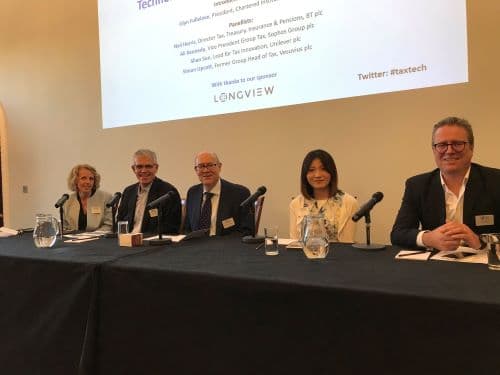'Keep it simple' is the key message from CIOT's Technology and Tax debate
‘Keep it simple’ when introducing technology into your tax management was a key message from the CIOT’s panel discussion on the impact of technology on the tax profession.
Shan Sun, Lead for Tax Innovation at Unilever plc, spoke about artificial intelligence (AI). Tax professionals tend to sit in silos, she said, but when you start to consider machine learning, these barriers need to come down. Shan explained how pattern analysis, pattern recognition and image recognition can help tax teams in large businesses. There is also potential in optimization, which can help deal with tax claims, and knowledge grafting. Obviously the quality of inputted data is crucial, as is the need for a business to identify the problems they wish new technology to rectify, she said. Shan spoke about the importance of working with stakeholders from the beginning when introducing AI into a business. She closed by talking about machine learning governance.
Neil Harris, Director Tax, Treasury, Insurance and Pensions, BT plc, said there is technology in the consumer space that is transforming tax management in BT today without waiting for bespoke systems to be ready. He said technology does not fix the perennial problem of getting the basics right, however. The tax profession needs to embrace technology and the language of technology. Appropriate use of robots can be a useful defence to HMRC when claiming you took ‘reasonable care’ with your accounts, he added, as robots tend to make fewer basic mistakes in repetitive processes than humans. BT has a ‘data lead’ which is not a rebadged tax compliance professional, rather someone with different skills. Neil also recommended the use of ‘chat bots’ and visualisation tools which help them communicate and understand issues with the wider company, such as mapping an organisation. But robots rely on accurate data, he warned.
Ali Kennedy, Vice-President Group Tax at Sophos Group plc, said she was on the panel to talk about the ‘pesky humans, she described herself as a “human API”. An API is an application programming interface, which is a software intermediary which sits between one programme and another. Heads of tax are inundated with companies coming to them with technology solutions, she said. Fiscal authorities are using technology to help monitor and collect indirect tax and this is now creeping into direct tax – expecting businesses to connect with tax authorities’ systems. The biggest problem for firms is getting good quality data out of their accounting system, doing something with it and then either getting it to the tax authority or getting it into their forecasting process; how do we grab good data and hope it is still good data by the end of this process?
Beware of free software from companies because it raises suspicions about what they will do with your data, Ali cautioned. Data is your most valuable commodity, after all.
Work with your tech department, she advised. Tax and tech people both work with rules, after all. If the data going in is terrible, the information coming out will be nonsense, she warned. She also recommended the use of “chat bots” to help with data entry. On cybersecurity, she said half an hour’s tuition can explain phishing, social engineering and ‘man in the middle’ attacks. She closed by saying that to future proof it is all about ‘keeping it simple, [keeping] data as clean as possible’ and using as few systems as possible.
The final panellist to speak was Simon Upcott, former Group Head of Tax at Vesuvius plc, who reflected on what technological advance means for the tax profession. He pointed to drivers for change such as people’s ‘need for speed’ and ‘wanting more from less’. He spoke of the importance of having an institutional infrastructure in place to improve, the need for quality data rather than quantity, the need to enhance tax professionals’ technology skills and other matters such as flexible staffing, data and systems audits and the need to invest in data analytics. He suggested that the CIOT could look at including more about technology in the CTA syllabus. When asked about this during a question and answer session, Ali said that tax firms need problem solvers whether they be tax people or technology people. She suggested that it is easier to teach tech people about tax than the other way around because of the risk of the latter having a ‘mental block’ when learning about technology. In contrast Simon’s view is that firms need a ‘dyed in the wool’ tax technical person to understand the power of technology and how to broach that technology.
CIOT President Glyn Fullelove chaired the debate which was held at the British Academy in St James', London. The audience was made up of CIOT members, other tax professionals, representative of finance service organisations, and people from companies and journalists.
The debate was sponsored by LongView.

Panel: (left to right) Ali Kennedy, Vice-President Group Tax at Sophos Group plc; Simon Upcott, former Group Head of Tax at Vesuvius plc; CIOT President Glyn Fullelove (chair); Shan Sun, Lead for Tax Innovation at Unilever plc; and Neil Harris, Director Tax, Treasury, Insurance and Pensions, BT plc.
The audio recording of the debate is available here.
Report by Hamant Verma
